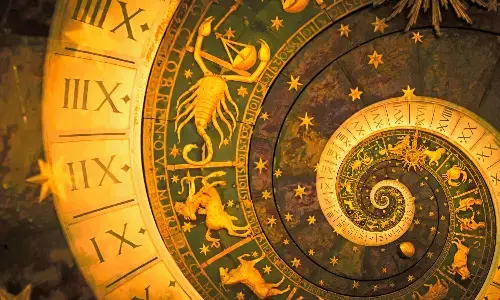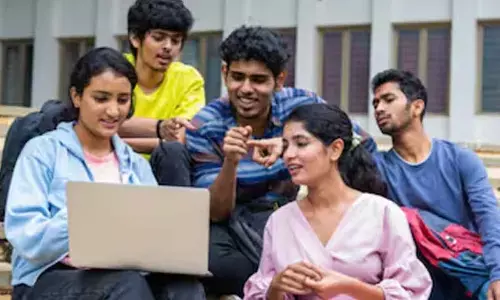Memories of a different era
 Memories of a different era
Memories of a different eraThe 'generation gap' is an expression that was used by our parents with our grandparents, by us with our own parents, by our children with us and, now, by our grandchildren with our children
The 'generation gap' is an expression that was used by our parents with our grandparents, by us with our own parents, by our children with us and, now, by our grandchildren with our children. While it is no doubt true, as the poet said, that "old order changeth yielding place to new", transitions from one generation to another are the best when they occur smoothly and gradually.
That, indeed, was the situation until recently. To feel that one's generation represents a watershed in the history of the world is natural for every generation of human beings. But, certainly, in the case of people born after the 1990s, spectacular and unprecedented technological and cultural changes have been the order of the day. From computer games, toys and 'zoom' school lessons to driverless cars and joyrides in space, youngsters today live in a totally different world. Music is composed, short movies are made and plays enacted with the aid of 'apps' available in laptops and smartphones. And the expressions and acronyms they use in communications (BTW, OMG etc.), defy comprehension completely! I recollect, in this context, my colleague Harinarayan's reaction to a circular issued in Andhra Pradesh Secretariat in the 1990s requiring everyone compulsorily to use Telugu language in file notings. Having already got exasperated with the insistence by the government of India on Hindi in place of English, he remarked, "I am now illiterate in three languages!"
And the range of knowledge acquired by children these days in regard to issues of concern to mankind, such as gender sensitivity, climate change, public health, environmental degradation and terrorism is really amazing. In our times, we were approaching middle age by the time the importance of such concerns were realised.
But, when all has been said and done, the children of today are really no different from what we were at that age. The innocent laughter is the same, as is the joy of indulging in fun and frolic. The temptation to play truant and the aversion to homework remain the same. In other words, although the environment may have changed and the instruments of entertainment undergone a striking transformation, the attitudes and preferences remain essentially the same. The French proverb "le plus ça change, le plus c'est le même chose", says it all. The more things change, the more they remain the same!
I had, in earlier pieces, shared with the readers some of the interesting experiences I had with important persons during my career. The response I have received from some of them has encouraged me to dwell upon a few more.
During my days as an Assistant Collector (under training) in Krishna district, the district was once hit by a very violent cyclonic storm. The then Revenue Minister, Thimma Reddy, came on a visit to ascertain the ground realities. The District Collector had asked me to call on the Minister. When I reached the guest house where he was staying, I was dressed casually, returning, as I was, from field inspections. When I was introduced to the Minister, he took one look at me and said, "Without this introduction, I would have taken you for a student," apparently referring to the absence of formal attire on my part. Although somewhat embarrassed, I was relieved when the Collector intervened on my behalf and explained the situation. People were quite fussy about formal dressing in those days.
I have written, earlier in this column, about my propensity to walk into embarrassing situations, albeit quite innocently. One such incident happened when I was the President of the Hyderabad Cricket Association and a one-day international match was being playing in the Lal Bahadur Shastri Stadium Hyderabad. Vijayabhaskara Reddy, the then Chief Minister, was to inaugurate the match. I duly received the CM and conducted him into the ground. Just I was about to formally request him to inaugurate the match, the microphone in my hand broke down! As it was, the CM was already somewhat cool towards me, account of a feeling he nursed that I had been close to his predecessor Janardhan Reddy. His attitude changed later but, on that day, it did not help much!
As I have mentioned earlier, this lockdown time has certainly encouraged a good deal of introspection. In my case, it has given me an opportunity to reflect upon the way life has treated me so far. Just as in the case of everyone else, I had the opportunity of living in different worlds from time to time from childhood to this day.
I was barely six years old when my histrionic career began, first with what was known as the "Balananda Sangham" (a children's organisation which taught us all to sing, dance, act etc., primarily through the medium of the, (then), All India Radio – today's Aakashvani). Very soon, that led to a foray into the film world, and I made a debut in 1952 as a child star in a trilingual movie called "Manohara". Over the next three years I acted in 28 movies in Telugu, Tamil and Hindi. Although I bade goodbye to the film world at age nine, the skills I acquired in acting were to come in useful much later. In fact, I told actor Chiranjeevi once that I had to act much more in my position as the Chief Secretary than I had ever done before, thanks to all the pretense one had to cultivate! It is not easy, I mean, to sport a smile when one is infuriated, and to appear angry only in order to discipline someone.
After completion of my post-graduation, and a short stint as a research scholar pursuing a doctorate, I joined the State Bank of India as a Probationary Officer. That lasted only for a few months as soon after completion of my training in the first branch, I got selected for the civil services. And then began a four-decade-long association with public life covering a wide span of diverse fields such as Commercial Taxes, General Administration, Handlooms and Textiles and Agriculture, apart from working as Secretary to the government of Andhra Pradesh and to the Vice President of India. During the period when I was serving in the State government as Secretary in the Department of Planning and Agriculture, I got elected as President of the Hyderabad Cricket Association, a completely different type of experience altogether. In fact, it was at the behest of the legendary cricketer Ghulam Ahmed that I took up that assignment.
After retirement from service, I was appointed as a member of the newly-constituted National Disaster Management Authority where I spent five years. Truly five memorable years, as I was able to leverage all my experience and wisdom into productive work in an important and hitherto neglected area.
All through the four decades of my service I maintained a close relationship with non-government and charitable organisations. Those included an organisation named Chetana started in the Raj Bhavan (in the wake of the 1977 cyclone that hit Andhra Pradesh), with Sharda Mukherjee, the then Governor, as the president, and another organisation named Anveshana, which I started as the Collector of Krishna district, which assignment I had taken up after leaving the Governor's secretariat. Much later, during my tenure in the government of India, I accepted a request to function as the president of the Delhi Telugu Academy, a vibrant and extremely active cultural and social organisation which also organises spiritual activities, largely for the benefit of the Telugu speaking residents of New Delhi.
After my return to Hyderabad, encouraged by the leisure I experienced after four decades of hectic activity, I started an organisation that served to fulfil some of my very long cherished desires. Named Vaaradhi, it aims to serve as a platform for like-minded organisations – a forum for exchange of views, pooling and sharing of experiences and focusing, primarily, on encouraging youth to become productive citizens of the country in the future. I note with satisfaction that, by and large, the organisation has shown promise and the ability to proceed in the right direction.
As I conclude this week's effort, I would like to draw the readers' attention to what I had said earlier about the lockdown period being becoming a bit of a crutch. The laid-back attitude one has got used to, the distancing from what were once obsessions in terms of daily activities and the systematic and regular daily routine may well prove to be part of a syndrome that one might find difficult to get out of post the lockdown period. A bit like the Stockholm, what?
(The writer is former Chief Secretary, Government of Andhra Pradesh)
















